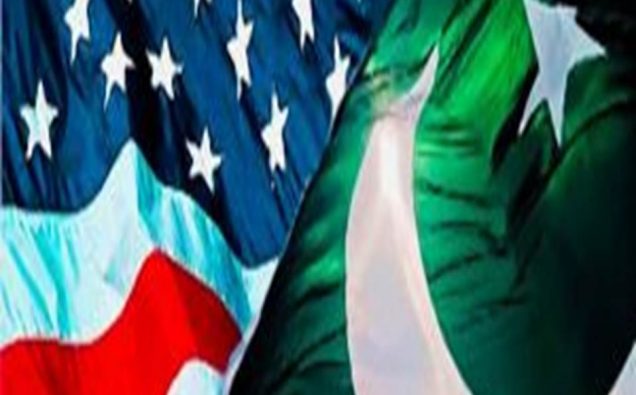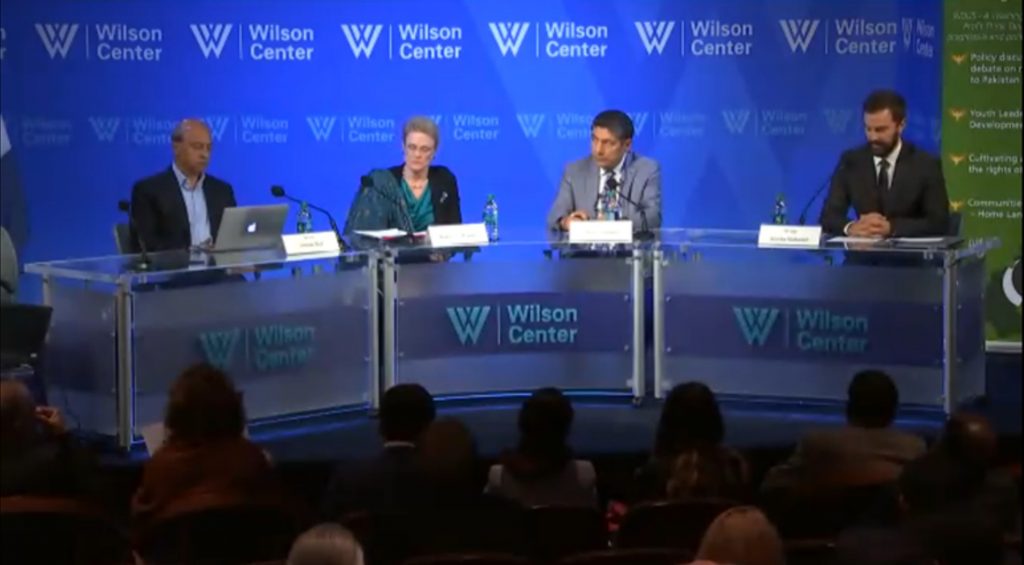
The complexity of U.S.- Pakistan relations and fears of yet another estrangement between the previously two close allies gained fresh spotlight this week with a series of discussions between some top experts.
“Pathways to Change: Pakistan Policy Symposium” – jointly hosted by Woodrow Wilson Center and Indus think tank – addressed both prospects and challenges the new Imran Khan government has before it. But the discussion invariably returned to the strained U.S.-Pakistan ties.
The discussion took place in the backdrop of a high-stakes paradox in the relationship stemming from the two countries’ apparent inability to live up to expectations and promises.
President Donald Trump recently cut off military assistance for Pakistan despite Washington’s dependence on the South Asian country for its desire to successfully conclude the 9/11-triggered Afghan war.
Pakistan, on the other hand, has a litany of grievances which it wants Washington to address and has not fully met the U.S. demands for action against Afghan militants despite its reliance on the United States for economic development.
Shuja Nawaz, author and longtime expert on South Asia, suggested some ways the two countries could work together to move out of the current impasse. Instead of the two countries getting something out of each other first, Nawaz proposed the two should first remove irritants out of the way, and then make a fresh start.
For Pakistan, he argued, it should not be a problem to give up the idea of getting arrears and suspended assistance – $ 300 million – that Islamabad says it must get from the coalition support fund for the services it has rendered in the fight against terror.
The Pakistani focus, Nawaz said, should be on securing U.S. support for economic assistance and loans as well as defense equipment.
Secondly, he said, Pakistan should free Dr. Shakil Afridi, who helped the U.S. in tracing the slain al-Qaeda chief Osama bin Laden in Abbottabad in 2011. Nawaz suggested that Pakistan could even have a trade off with the U.S. and exchange Afridi for jailed Pakistani scientist Dr. Afia Siddiqui.
Islamabad, he said, should also open its border to India for trade with Afghanistan under Transit Trade Agreement. That would bring Pakistan leverage over India.
For the United States, it will make sense to help Pakistan get a bailout package from the IMF and even loans from the World Bank in return for its cooperation.
“Pakistan is far too important a country, not just for its geographic and strategic location but because of thee economic potential and as a source of stability for the region which is going to be wracked by conflicts and sectarian and ethnic violence whether it is Central Asia, whether it is Iran, Afghanistan, Kashmir and conflict with India, all of these potential hazards not just for the region but for the world.
“On the plus side, I believe the potential for realigning this relationship exists, potential for a new compact for the region exists in which Pakistan, Afghanistan, Central Asia Iran, India, China should play roles,” Shuja Nawaz reasoned.
But Laurel Miller, a senior political scientist with RAND Corporation noted that under current circumstance, Pakistan is seen in Washington as bringing little positive relevance to the table.
Trump, she said, is an “ultimate transactionalist” and would like to see what benefits could Pakistan actually bring to the relationship.
David Sedney, Senior Associate, Center for Strategic and International Studies, and former U.S. Deputy Assistant Secretary of Defense for Afghanistan, Pakistan, and Central Asia made the argument that Pakistan’s nuclear program and security and terrorism should constitute the top issues in the U.S. perspective.
Pakistani experts including Hasan Askari-Rizvi, Professor Emeritus of Political Science, Punjab University, Lahore
Salman Bashir, Former Pakistani Foreign Secretary and Imtiaz Gul, Executive Director, Center for Research and Security Studies, Islamabad highlighted Pakistan’s sacrifices in the war on terror and spelled out Pakistani security concerns vis-à-vis Afghanistan, including the Indian designs.
Robin Raphel, former U.S. Assistant Secretary of State for South Asia, touched on some of the challenges facing both Pakistan and Afghanistan in their fight against terror and also listed some Pakistani concerns in her remarks.
Afghan diplomats presented Kabul’s concerns over the Afghan Taliban’s finding sanctuaries on the Pakistani side – a point which Pakistani analysts countered by pointing out that the Taliban control vast swathes of the country and logically would not need sanctuaries on the Pakistani side where the army has moved against militants.
The opinions expressed by the paricipants underlined the two countries are still a long way off a point where they could have a trusting relationship due to reasons centering primarily on Afghan war controversies. But, still the U.S. and Pakistan could find a viable way forward in the relationship, considered key to South Asian stability. The onus, as Nawaz suggested, seems to be on Pakistan to take the initiative, since the Trump Administration has clearly drawn the line for moving forward the relationship.
















Pakistan should plan a short term transactional relationship addressing US concerns over nuclear risk and terrorism first to seek IMF bailout and reschedule it’s debt profile .
Realign it’s mid to long term policy goals without US .It’s going to be otherwise late in the new Asian order.